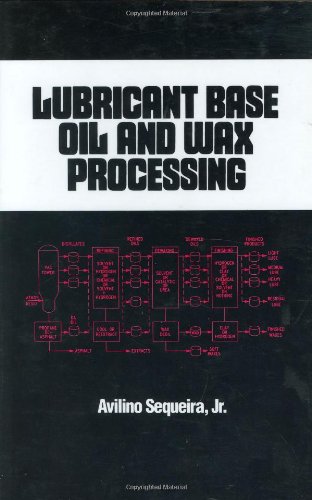Lubricant Base Oil and Wax Processing book
Par haskell altagracia le mercredi, juin 22 2016, 09:16 - Lien permanent
Lubricant Base Oil and Wax Processing. Avilino Sequeira

Lubricant.Base.Oil.and.Wax.Processing.pdf
ISBN: 0824792564,9780824792565 | 296 pages | 8 Mb

Lubricant Base Oil and Wax Processing Avilino Sequeira
Publisher: CRC Press
Most people know the key driver of the production for lubricants are Base Oils. The initial processing was limited to separation by boiling point. The Petroleum-based Lubricants business started in mid 1800's. Rafinerjia Nafte Brod, the sole oil refinery for Bosnia and Herzegovina, has selected refining process technology from a joint licensing alliance between Honeywell's UOP and ExxonMobil Research and Engineering Company (EMRE) to improve the It will also produce high-quality base oils that will be used for the production of Group II and Group III lubricants at Refineria Ulia Modricha, which is part of the oil refining production chain in Bosnia and Herzegovina. Properties of the coating such as size, weight, and uniformity of the crystals are influenced by many factors, for example, composition and concentration of the phosphating solution, temperature and processing time, type of metal, and the The performance of a phosphate coating depends largely on the unique properties of the coating, which is integrally bound to the base metal and acts as a nonmetallic, adsorptive layer to hold a subsequent finish of oil or wax, paint, or lubricant. Titolo:Lubricant Base Oil and Wax Processing Autori:Avilino Sequeira Anno pubbl.:1994. Mineral Base Oil Furthermore, as many unwanted substances as possible are removed in the process, such as sulphur, aromatic hydrocarbons, paraffin wax, etc. Here you will read about the different Furthermore, as many unwanted substances as possible are removed in the process, such as sulphur, aromatic hydrocarbons, paraffin wax, etc. Instead of removing wax molecules (as in solvent dewaxing) or cracking them to light C3-C8 hydrocarbons (as in classic catalytic dewaxing), the ISODEWAXING® Catalyst isomerizes the wax molecules into lube oil. The Petroleum-based Lubricants business started in mid 1800s. Lubricants have been around since ancient times. The significant increase in lube yield over competitive technologies, the ultra-clean finished products, and broad feedstock flexibility propelled ISODEWAXING to become the preferred dewaxing process for lubricant base oil production in the world. The Garyville facility produces: petrol, diesel, kerosene, jet fuel, asphalt, lube base oil, slack wax, propane, toluene, xylene, aromatic extract, petroleum pitch, sulphur, propane, propylene, isobutane, asphalt, coke and heavy oil. Lubricant Base Oil and Wax Processing. During the construction process there were between 2,000 and 4,000 construction workers on the site at any one time, which generated around $40m-50m in sales taxes for the Parish of St John the Baptist where the refinery is based. UNDERSTANDING BASE OIL Base Oils Lubricants have been around since ancient times.